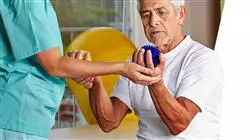University certificate
The world's largest faculty of medicine”
Introduction to the Program
TECH provides you with the most recent knowledge on Neuropsychological Assessment and Rehabilitation in a comfortable way”

The scientific development and the impulse that neuropsychology has had has allowed the that is carried out to have a high validity with results that equal and sometimes exceed the usefulness of medical tests. This has allowed this specialty to be used to treat patients with neurodegenerative diseases such as multiple or amyotrophic lateral sclerosis, Parkinson's or Alzheimer's. In order for the medical professional to update their knowledge, TECH presents this Postgraduate diploma in Neuropsychological Assessment and Rehabilitation.
A program taught exclusively online by a specialized teaching team that will allow students to delve into the latest news on neurodegenerative diseases, the neuropsychological clinical approach to patients and the most effective drug treatments today. It is a flexible educcational option that allows the professional to delve into a syllabus with a theoretical-practical approach, while making quality teaching compatible with their work and/or personal responsibilities.
Therefore, during the 6 months this program lasts, professionals will be able to take advantage of their knowledge through didactic content that uses the latest technology in education and simulations of practical cases, which will put them in a position to face real clinical problems.
An excellent opportunity that TECH offers to all medical professionals who want to study comfortably for a university degree. To do this, you will only need an electronic device with an Internet connection to access the virtual platform where the entire syllabus is hosted from the very start, Video summaries, videos in detail or specialized readings complement the study plan, which you can access without fixed schedules or face-to-face.
If you need an online program designed so you can balance a quality education with your personal responsibilities. TECH has come up with this degree for you”
This Postgraduate diploma in Neuropsychological Assessment and Rehabilitation contains the most complete and up-to-date scientific program on the market. The most important features include:
- The development of practical cases presented by experts in Psychology and Immunology
- The graphic, schematic, and practical contents with which they are created, provide scientific and practical information on the disciplines that are essential for professional practice
- Practical exercises where self-assessment can be used to improve learning
- Its special emphasis on innovative methodologies
- Theoretical lessons, questions for the expert, debate forums on controversial topics, and individual reflection assignments
- Content that is accessible from any fixed or portable device with an Internet connection
With this university program you will have 24-hour access to the most innovative syllabus that delves into the bases of psychopharmacological treatment”
The program’s teaching staff includes professionals from the sector who contribute their work experience to this educational program, as well as renowned specialists from leading societies and prestigious universities.
Its multimedia content, developed with the latest educational technology, will provide the professional with situated and contextual learning, i.e., a simulated environment that will provide an immersive education designed to learn in real situations.
This program is designed around Problem-Based Learning, whereby the professional must try to solve the different professional practice situations that arise throughout the program. This will be done with the help of an innovative system of interactive videos made by renowned experts.
If you need an online program designed so you can balance a quality education with your personal responsibilities. TECH has come up with this degree for you”

A program that will bring you closer to what's new in the rehabilitation of patients with multiple sclerosis, Alzheimer's or dementia"
Why study at TECH?
TECH is the world’s largest online university. With an impressive catalog of more than 14,000 university programs available in 11 languages, it is positioned as a leader in employability, with a 99% job placement rate. In addition, it relies on an enormous faculty of more than 6,000 professors of the highest international renown.

Study at the world's largest online university and guarantee your professional success. The future starts at TECH”
The world’s best online university according to FORBES
The prestigious Forbes magazine, specialized in business and finance, has highlighted TECH as “the world's best online university” This is what they have recently stated in an article in their digital edition in which they echo the success story of this institution, “thanks to the academic offer it provides, the selection of its teaching staff, and an innovative learning method aimed at educating the professionals of the future”
A revolutionary study method, a cutting-edge faculty and a practical focus: the key to TECH's success.
The most complete study plans on the university scene
TECH offers the most complete study plans on the university scene, with syllabuses that cover fundamental concepts and, at the same time, the main scientific advances in their specific scientific areas. In addition, these programs are continuously being updated to guarantee students the academic vanguard and the most in-demand professional skills. In this way, the university's qualifications provide its graduates with a significant advantage to propel their careers to success.
TECH offers the most comprehensive and intensive study plans on the current university scene.
A world-class teaching staff
TECH's teaching staff is made up of more than 6,000 professors with the highest international recognition. Professors, researchers and top executives of multinational companies, including Isaiah Covington, performance coach of the Boston Celtics; Magda Romanska, principal investigator at Harvard MetaLAB; Ignacio Wistumba, chairman of the department of translational molecular pathology at MD Anderson Cancer Center; and D.W. Pine, creative director of TIME magazine, among others.
Internationally renowned experts, specialized in different branches of Health, Technology, Communication and Business, form part of the TECH faculty.
A unique learning method
TECH is the first university to use Relearning in all its programs. It is the best online learning methodology, accredited with international teaching quality certifications, provided by prestigious educational agencies. In addition, this disruptive educational model is complemented with the “Case Method”, thereby setting up a unique online teaching strategy. Innovative teaching resources are also implemented, including detailed videos, infographics and interactive summaries.
TECH combines Relearning and the Case Method in all its university programs to guarantee excellent theoretical and practical learning, studying whenever and wherever you want.
The world's largest online university
TECH is the world’s largest online university. We are the largest educational institution, with the best and widest online educational catalog, one hundred percent online and covering the vast majority of areas of knowledge. We offer a large selection of our own degrees and accredited online undergraduate and postgraduate degrees. In total, more than 14,000 university degrees, in eleven different languages, make us the largest educational largest in the world.
TECH has the world's most extensive catalog of academic and official programs, available in more than 11 languages.
Google Premier Partner
The American technology giant has awarded TECH the Google Google Premier Partner badge. This award, which is only available to 3% of the world's companies, highlights the efficient, flexible and tailored experience that this university provides to students. The recognition as a Google Premier Partner not only accredits the maximum rigor, performance and investment in TECH's digital infrastructures, but also places this university as one of the world's leading technology companies.
Google has positioned TECH in the top 3% of the world's most important technology companies by awarding it its Google Premier Partner badge.
The official online university of the NBA
TECH is the official online university of the NBA. Thanks to our agreement with the biggest league in basketball, we offer our students exclusive university programs, as well as a wide variety of educational resources focused on the business of the league and other areas of the sports industry. Each program is made up of a uniquely designed syllabus and features exceptional guest hosts: professionals with a distinguished sports background who will offer their expertise on the most relevant topics.
TECH has been selected by the NBA, the world's top basketball league, as its official online university.
The top-rated university by its students
Students have positioned TECH as the world's top-rated university on the main review websites, with a highest rating of 4.9 out of 5, obtained from more than 1,000 reviews. These results consolidate TECH as the benchmark university institution at an international level, reflecting the excellence and positive impact of its educational model.” reflecting the excellence and positive impact of its educational model.”
TECH is the world’s top-rated university by its students.
Leaders in employability
TECH has managed to become the leading university in employability. 99% of its students obtain jobs in the academic field they have studied, within one year of completing any of the university's programs. A similar number achieve immediate career enhancement. All this thanks to a study methodology that bases its effectiveness on the acquisition of practical skills, which are absolutely necessary for professional development.
99% of TECH graduates find a job within a year of completing their studies.
Postgraduate Diploma in Neuropsychological Assessment and Rehabilitation
Neuropsychology has become a discipline of great relevance in the field of medicine, as it allows to know in depth the functioning and cognitive status of the patient. For this reason, TECH has designed this Postgraduate Diploma in Neuropsychological Assessment and Rehabilitation, a 100% online program that will allow you to delve into neurodegenerative diseases, the clinical neuropsychological approach to patients and the most effective pharmacological treatments. The syllabus is taught by a specialized teaching team that uses the latest technology in education to provide quality teaching.
A flexible and quality learning without worrying about schedules or travel
.
With the Postgraduate Diploma in Neuropsychological Assessment and Rehabilitation you will be able to update you on the latest advances in the care and approach to neurodegenerative diseases, from a theoretical-practical approach by performing simulations of clinical cases, which will allow you to put into practice your knowledge and improve your skills in neuropsychological assessment and rehabilitation. All this from the hand of recognized specialists in the area that will guide you in your academic process.







